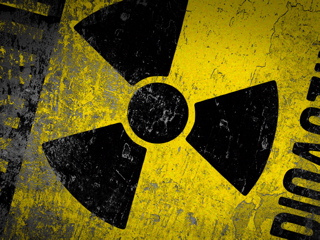In 2004 the Palestinian leader Yassir Arafat, who had been confined by Israel to his walled compound, suddenly became violently ill. He died soon after, of a massive stroke complicated by "inflammation, jaundice, and a blood condition known as disseminated intravascular coagulation, or DIC."
Arafat had long been considered a road block to peace in the middle East. And many Israeli citizens blamed Arafat for killing countless Israelis during the long-running conflict between Israel and Palestine. Arafat's death was considered suspicious at the time, but no evidence of poison was found, and so Arafat's body was interred in a tomb.
But recently, Arafat's widow - who has contended all along that Arafat was assassinated - was able to get some of his belongings tested for polonium-210. Lo and behold, a Swiss nuclear research facility was able to confirm the presence of this lethal radioactive element.
The next step is to test Arafat's body itself. Experts caution that this may not be fool-proof, as polonium-210 breaks down significantly after eight years. In fact, some people are suspicious about the fact that Arafat's belongings held onto enough polonium-210 to test positive after all this time.
Polonium-210 is probably best known from the world of spycraft as the element which killed former KGB agent Alexander Litvinenko in London in 2006. Litvinenko was a KGB officer who was arrested by the Russian authorities after he publicly accused the KGB of ordering the assassination of a prominent Russian politician. After his arrest, he obtained asylum in London where he became a freelance writer and consultant for MI5 and MI6.
Tests confirmed that Litvinenko was poisoned by polonium-210 which had been slipped into his tea. This was the first recorded case of polonium-210 poisoning, but many security experts suspect it was neither the first nor the last.
In many ways, polonium-210 is ideal for this purpose. Unlike most other radioactive elements, it does not emit gamma radiation, which means that it will not set off most radiation detectors. Polonium-210 emits only alpha particles, which are so weak that they can be blocked by a sheet of paper, or human skin. This means that the element can safely be carried by a would-be assassin, without risking the assassin's own health.
Once in the body, however, the alpha particles wreak havoc. They penetrate soft tissue easily, destroying organs just like "normal" radiation poisoning - but from within the body.
